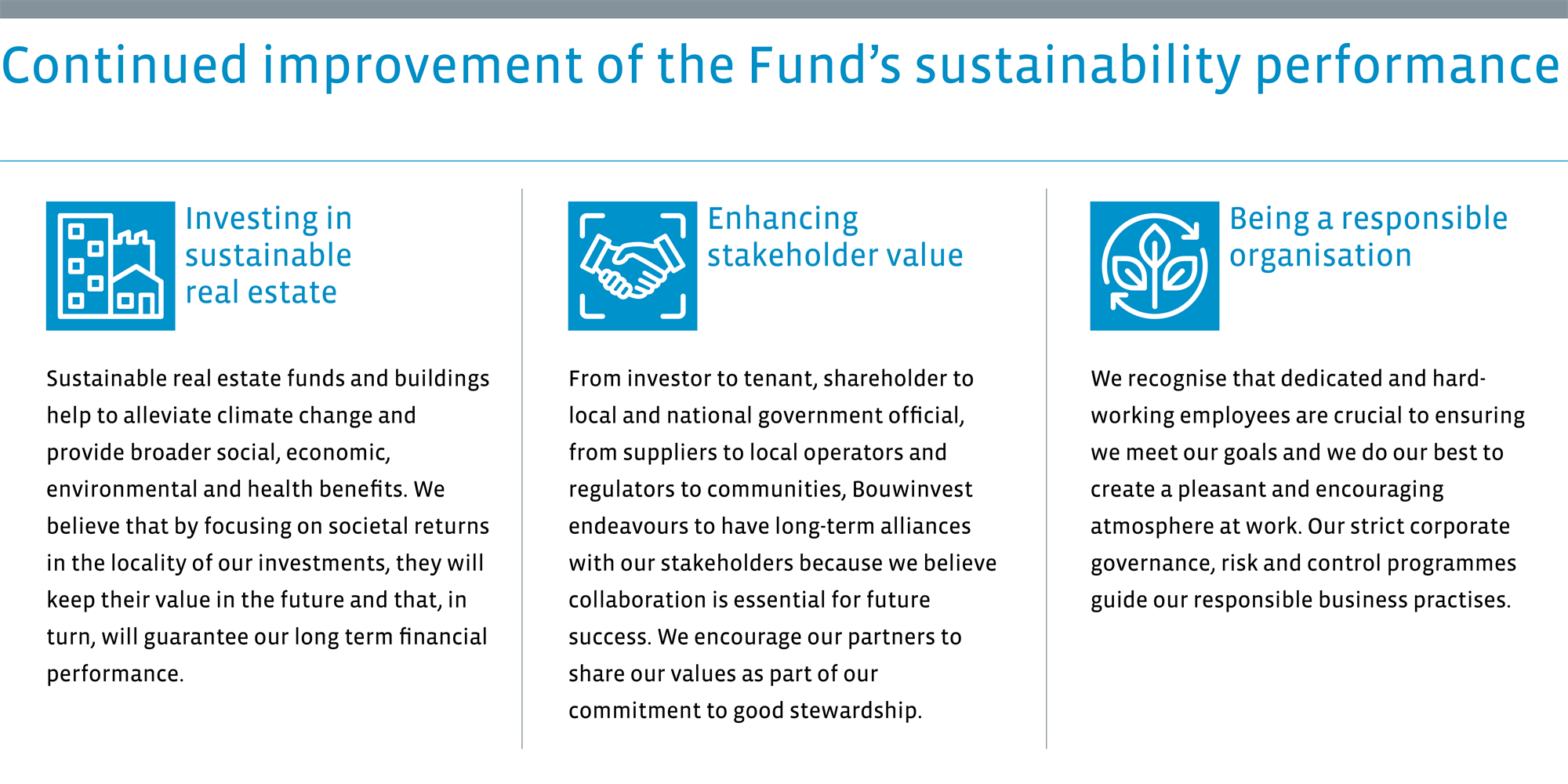We believe Responsible Investment is about all employees and affiliated organisations taking the initiative to help improve the environment and society. The built environment consumes around 40% of the world’s energy and accounts for up to 30% of the world’s annual GHG emissions. Additionally, the building industry is a large user of raw materials. As a global real estate investor, we feel it is part of our responsibility to help find solutions. To contribute to a CO2-neutral, sustainable, circular, resilient and healthy living environment, and to enhance stakeholder value by investing in sustainable real estate.
Long-term climate change ambition: near ‘energy neutral’ portfolio before 2045
The Fund endorses the area-focused approach proposed by the Dutch government. If one of our properties is located in a pilot district/neighbourhood for climate agreement-related initiatives, we will cooperate as much as we can. In the period 2019-2021, the Fund will draw up a 'Paris-proof' roadmap 2030/2050 to determine how we will use smart methods to make the entire portfolio near energy neutral before 2045 (maximum 50kWh/m2 GLA). The basic premise of this initiative is that any improvements are affordable, fit into our maintenance cycle and are aligned with the area-focused approach of the municipal authority in question. Whenever any gas-powered installations are replaced in the coming years, we will expressly weigh the feasibility of replacing these with (nearly) natural gas-free installations.
In addition to this, we continue to make an active contribution to the concrete measures aimed at realising the climate agreement and regional plans via various channels (including the Dutch Association of Institutional Property Investors, IVBN, and the Dutch Green Building Council).
To make a start, we have formulated the following ‘Paris-proof’ objectives for the mid-term:
2021-2030: Year-on-year reduction of 5% in GHG emissions for the total portfolio (general and tenant consumption)
2030: Our portfolio has a weighted average energy label A (energy index <1.0)
Strategy: maintain GRESB 5-star rating
Our long-term strategy to keep the Fund highly sustainable and maintain its GRESB 5-star rating is based on three main pillars:

It is important to keep the Fund highly sustainable and make a positive contribution to the United Nations’ Sustainable Development Goals (UN SDGs), which include Sustainable cities and communities (SDG 11), Affordable and clean energy (SDG 7) and decent work and economic growth (SDG 8). The Office Fund's goal is therefore to maintain its GRESB 5-star rating.

Summary of Responsible Investment
The Fund has targets in line with its Responsible Investment objectives and long-term climate ambitions. In 2018, the Fund made significant progress on its Responsible Investment objectives and targets, as shown in the table below. The 2018 results according to INREV sustainability guidelines are explained in the following sections. For more detailed information, please see the Responsible Investment performance indicators on page 107 of this annual report.
| | Results responsible investment 2018 |
Continued improvement of the Fund's sustainability performance | We improved our GRESB score by 2 points (total 88 points) and retained the highest GRESB rating of 5 stars |
Investing in sustainable real estate | 98% of our investments and acquisitions have minimum BREEAM-NL in-use GOOD certificate.
|
In 2018, we realised a 0.3% like-for-like increase of energy consumption. In 2018, we started with the installation of 224kWp of solar panels, which will be completed in Q1 2019. This resulted in 73% green label portfolio with an average energy index of 1.05. |
Enhancing stakeholder value | Tenant satisfaction survey: 6.6 |
All (100%) construction sites are registered under Considerate Constructors Scheme (‘Bewuste Bouwer’).
A signed Energy Performance Contract with Engie for WTC The Hague will support long-term improvement of energy efficiency.
A sustainable procurement document we developed will enable us to improve the sustainable maintenance of assets. |
Being a responsible organisation | Zero incidents and sanctions as a result of non-compliance |